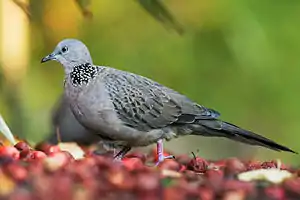Spilopelia
Spilopelia is a genus of doves that are closely related to Streptopelia, yet distinguished from them by differences in morphology and behavior. Some authors have argued that Stigmatopelia is the valid name as it appears in an earlier line although also erected by the Swedish zoologist Carl Sundevall,[1][lower-alpha 1][3] but Richard Schodde and Ian J. Mason in their zoological catalogue of Australian birds chose Spilopelia citing clause 24(b) of the International Code of Zoological Nomenclature (ICZN) which supports the decision of the first reviser.[4][5] The name Spilopelia combines the Ancient Greek spilos meaning "spot" and peleia meaning "dove".[6]
| ||||||||||||||||||||||||||||||||||||||||||||||||||||||||||||||||||||||||||||||||||||||||||||||||
| A phylogenetic position based on Johnson et al. (2001). A second possibility is that Columba is a sister of Streptopelia but the remaining clades appear to be monophyletic.[7] |
| Spilopelia | |
|---|---|
 | |
| Spotted dove (S. chinensis) with plumage pattern of S. c. tigrina | |
| Scientific classification | |
| Domain: | Eukaryota |
| Kingdom: | Animalia |
| Phylum: | Chordata |
| Clade: | Dinosauria |
| Class: | Aves |
| Order: | Columbiformes |
| Family: | Columbidae |
| Subfamily: | Columbinae |
| Genus: | Spilopelia Sundevall, 1873 |
| Species | |
|
See text | |
| Synonyms | |
|
Stigmatopelia | |
Species
The genus includes just two species:[8]
- Spotted dove, Spilopelia chinensis
- Laughing dove, Spilopelia senegalensis
Some ornithologists split the spotted dove into the eastern spotted dove (Spilopelia chinensis) and the western spotted dove (Spilopelia suratensis).[9][10]
Notes
- The title page of Sundevall's book gives the year as 1872. The book was issued in two parts and the second part from page 74 that includes Spilopelia was published in 1873.[2]
References
- Sundevall, Carl (1872). Methodi naturalis avium disponendarum tentamen. Försök till fogelklassens naturenliga uppställnung (in Latin). Stockholm: Samson and Wallin. p. 100.
- Mathews, Gregory M. (1920). "Dates of ornithological works". Austral Avian Record. 4 (1): 1–27 [23].
- Cheke, Anthony S. (2005). "Naming segregates from the Columba–Streptopelia pigeons following DNA studies on phylogeny". Bulletin of the British Ornithologists' Club. 125 (4): 293–295.
- Schodde, R.; Mason, I.J. (1997). Zoological Catalogue of Australia. Aves (Columbidae to Coraciidae). Vol. 37. CSIRO publishing. p. 20. ISBN 978-0-643-06037-1.
- "Chapter 6: Validity of names and nomenclatural acts. Art. 24.2". International Code of Zoological Nomenclature (4th ed.). International Commission on Zoological Nomenclature. 1999.
- Jobling, James A. (2010). The Helm Dictionary of Scientific Bird Names. London: Christopher Helm. p. 362. ISBN 978-1-4081-2501-4.
- Johnson, K.P.; De Kort, S; Dinwoodey, K.; Mateman, A.C.; Ten Cate, C.; Lessells, C.M.; Clayton, D.H. (2001). "A molecular phylogeny of the dove genera Streptopelia and Columba" (PDF). Auk. 118 (4): 874–887. doi:10.1642/0004-8038(2001)118[0874:AMPOTD]2.0.CO;2. hdl:20.500.11755/a92515bb-c1c6-4c0e-ae9a-849936c41ca2.
- Gill, Frank; Donsker, David; Rasmussen, Pamela, eds. (2020). "Pigeons". IOC World Bird List Version 10.1. International Ornithologists' Union. Retrieved 5 March 2020.
- Baptista, L.F.; Trail, P.W.; Horblit, H.M.; Kirwan, G.M.; Garcia, E.F.J. (2020). del Hoyo, J.; Elliott, A.; Sargatal, J.; Christie, D.A.; de Juana, E. (eds.). "Eastern Spotted Dove (Spilopelia chinensis)". Handbook of the Birds of the World Alive. Lynx Edicions. doi:10.2173/bow.spodov.01. S2CID 216386337. Retrieved 7 March 2020.
- del Hoyo, J.; Collar, N.; Kirwan, G.M.; Garcia, E.F.J. (2020). del Hoyo, J.; Elliott, A.; Sargatal, J.; Christie, D.A.; de Juana, E. (eds.). "Western Spotted Dove (Spilopelia suratensis)". Handbook of the Birds of the World Alive. Lynx Edicions. doi:10.2173/bow.spodov.01. S2CID 216386337. Retrieved 7 March 2020.